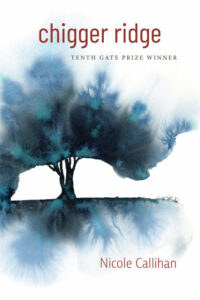 Review by Carol Dorf
Review by Carol Dorf
chigger ridge, the winner of The Word Works: Tenth Gate Prize, chosen by Sandra Lim, is Nicole Callihan’s third full-length poetry collection. Callihan has also published three poetry chapbooks and a novella.
This coming of age story set in rural West Virginia locates the mountain in a place where “sometimes it’s better to be hollow/to have nothing is to have nothing to take” (from “mine”). The book is sparse in terms of characters as well. There is the girl, an “old man,” and a boyfriend named “malachi”. There are also a few passing characters including a church lady.
The form of the book is very consistent in that each poem has a one word title, all lowercase letters, and no punctuation.
The only named character, “malachi” which means prophet, has a sexual charisma with the narrator within the confines of adolescent petting. At the same time, or maybe part of that emotion, there is a violence in his character, expressed in one poem through shooting, and in another through pulling feathers off birds to study flight.
Callihan creates a world in these poems through her careful, resonant use of sound and wordplay. The poem “psalm” illustrates how she does this work:
to stand on the mountain and try to find words
for things to try to find the order of the things
to try to find the letters that make the words
that turn utterance into something he or she or they
might toad firefly longing understand into incant
enchant enchanted be the meek for they shall inherit…(50).
This poem combines biblical language with daily language, while at the same time admitting play. In a passage like “longing understand into incant/enchant/enchanted,” we are brought to the magic of language. “psalm” also brings forward the intensity of the narrator’s longing “think of an animal/you’d like to bury yourself in now hold that feeling/to a flame now spitwash your dark now become other” In these lines the repetition of “now” adds to the incantatory quality of one particular moment.
“eels,” which refers to language from T. S. Eliot, and Andrew Marvell is a wonderful example of a child/a poet taking what is given and making it her own:
let us go then you and I let us go let us
be the eye pry the eye pie-eyed if this be
world enough and time if this be the world we
were granted…(40).
Again, we hear the sound play with “eye/pry/pie-eyed” and the repetition of the end rhymes. The boldness of this poem giving the language of the “masters” of poetry to an adolescent girl is a way of reassigning the power of language.
In chigger ridge Nicole Callihan creates a compelling world out of the difficult materials of a hard-scrabble adolescence, vividly bring that world forward in images as diverse as “drawers lined with velvet roses,” (from “lace”) and “all winter the loblollies violated the moon.” (from “moon”). What gives us hope for the character she creates is her ability to play with language, creating richness out of the materials of this life.
The last poem in the book “Epilogue” (the only poem with a capitalized title) gives us a capsule view of how the narrator gets from chigger ridge to the world of poetry. This book of poems about a very small place gives us an expanded view of the worlds poetry can create.
chigger ridge by Nicole Callihan
The Word Works, 2024 $19.00
ISBN 9781944585822
Carol Dorf has received fellowships from the Hawthornden Foundation, Zoeglossia, and the Napa Valley Writers’ Conference. Their writing appears on the Poetry Foundation website, in several chapbooks, and in journals that include Pleiades, About Place, Cutthroat, Braving the Body, Mom Egg Review, American Stories, Five South, YesYesPoetry, and Scientific American. Founding poetry editor of Talking Writing, they taught math and writing at Berkeley High, as well as at museums and conferences.
